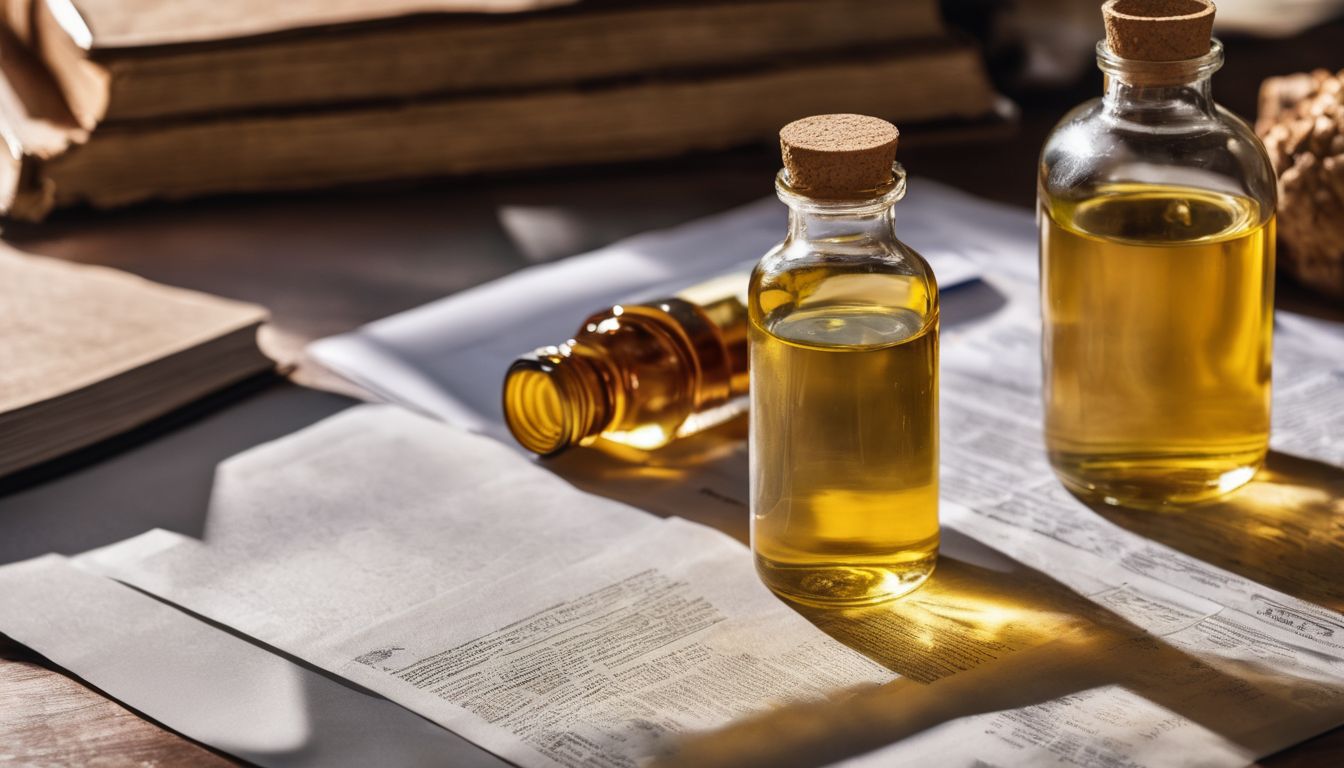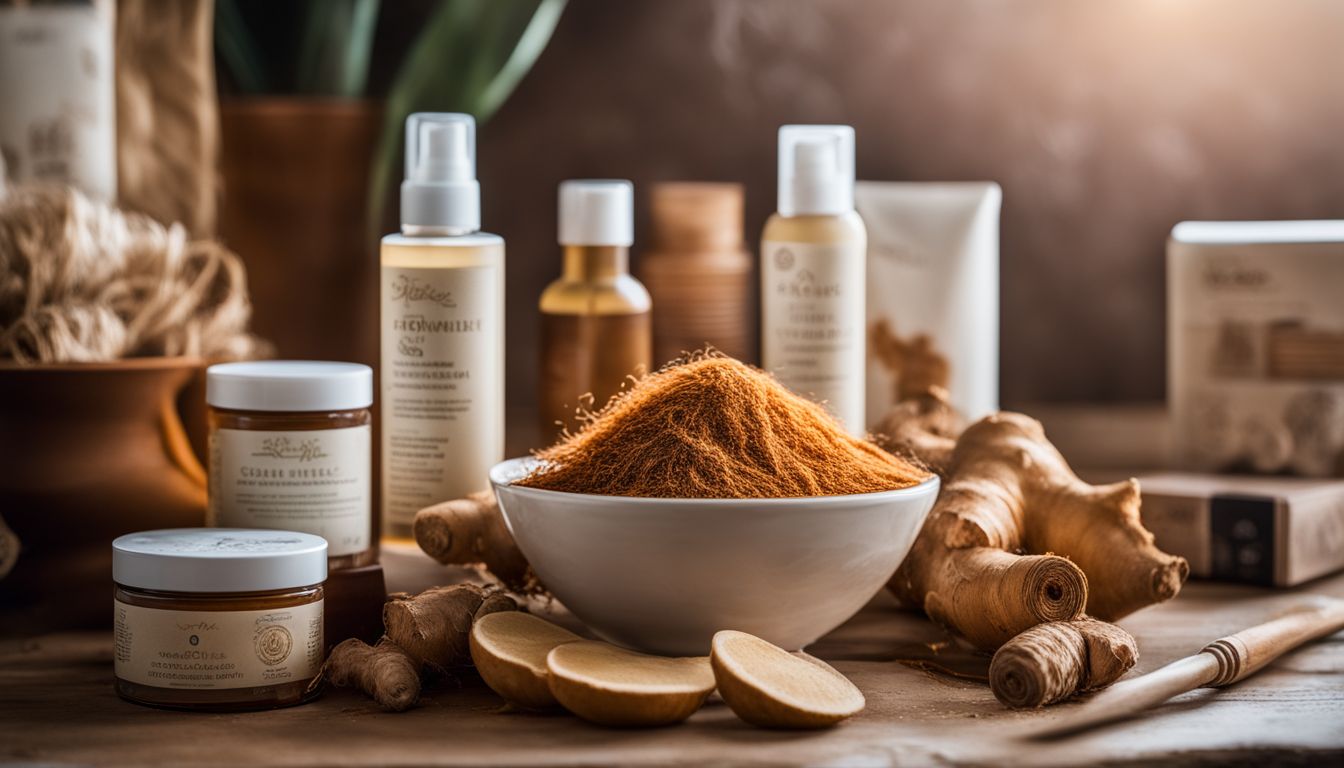
Are you worried that using ginger on your hair might do more harm than good? Though it’s a hot trend for boosting hair growth, experts have some surprising news about ginger. Our blog will dive into the real effects of ginger on your locks, from scientific insights to safe application tips.
Keep reading to uncover the truth and make informed choices for your hair care routine!
Key Takeaways
- Ginger contains 6 – gingerol, which might not stimulate hair growth as often believed but can suppress it by affecting the hair follicle development.
- Although ginger has antioxidant and anti – inflammatory properties beneficial for scalp health, it is unlikely to induce significant hair regrowth and may impede new hair shaft formation.
- Applying ginger directly to different hair types requires caution as its effects vary; it could potentially help with scalp conditions yet might be damaging for those experiencing hair loss.
- For optimal results without adverse reactions, consider using proven treatments like minoxidil for growth while employing ginger in moderation for its soothing properties on the scalp.
- Mixing ginger with other ingredients such as lemon or castor oil should be done mindfully to avoid complications and negative side effects, especially when dealing with color-treated or brittle hair.
Understanding the Effects of Ginger on Hair
Ginger contains 6-gingerol, which has been found to play a role in promoting hair growth. Additionally, the mechanism of ginger in hair follicle growth has been studied extensively.
The role of 6-gingerol in hair growth
6-gingerol, a potent compound in ginger, has sparked interest for its effects on hair. Contrary to popular belief and social media claims, research indicates that it may actually suppress hair growth rather than stimulate it.
Studies have shown this component can interfere with the development of the hair follicle, suggesting its benefit lies more in scalp health due to its anti-inflammatory properties.
The compound’s ability to act as an anti-inflammatory agent makes it valuable for maintaining a healthy scalp environment which is essential for overall hair well-being. However, those looking for solutions to enhance their locks might need to look beyond 6-gingerol.
Moving forward, understanding the mechanism of ginger in hair follicle growth provides further insight into how this common kitchen spice interacts with our strands.
Mechanism of ginger in hair follicle growth
Ginger’s active compound, 6-gingerol, may not be the hair growth stimulant some believe it to be. Research from the National Library of Medicine indicates that this component could actually slow down follicular activity rather than enhance it.
Instead of promoting anagen – the hair’s growing phase – 6-gingerol has been shown to potentially inhibit it.
The application of ginger directly onto the scalp can sometimes do more harm than good for those looking to boost their hair growth. While its nutrients can contribute to stronger and healthier hair, there is no direct link between topical ginger use and increased hair production.
It’s important for individuals considering ginger as a treatment for their mane to understand its real effects on the follicles before incorporating it into their routine.
The Benefits of Ginger for Hair Health

Ginger is known to enhance hair growth and has been used for centuries in traditional medicine to treat scalp conditions. Understanding the positive effects of ginger on hair health can help you make informed decisions about incorporating it into your hair care routine.
Enhancing hair growth
Despite popular belief, ginger may not be the miracle remedy for boosting hair growth. In fact, studies suggest that its components can inhibit the function of dermal papilla cells—those powerhouses behind hair follicle development.
These inhibitory and pro-apoptotic effects mean ginger is unlikely to stimulate your locks into a growing frenzy. If you’re looking to increase hair length or combat baldness, relying on this spicy root could disappoint.
Focusing on proven treatments like minoxidil might offer more hope for those seeking luscious strands. While antioxidants in ginger protect against aging in existing hair fibers, they do not encourage new growth.
So before reaching for a ginger-infused scalp treatment, consider other avenues that provide nourishment without impeding your hair’s natural cycle. Next up: managing common scalp conditions with gingery care.
Ginger is not just a kitchen staple; it’s also a powerful ally for your scalp. Its natural properties help combat irritation and boost hair health.
- Soothes scalp acne: The anti-inflammatory qualities of ginger make it an effective remedy for scalp acne. Applying ginger topically can reduce redness and swelling associated with acne on the scalp.
- Fights inflammation: Ginger contains potent compounds that calm inflamed skin, making it ideal for treating various scalp conditions.
- Enhances hair strength: Nutrients in ginger strengthen the hair from root to tip. This results in stronger strands that are less prone to breakage and damage.
- Heals irritation: Many people suffer from itchy or irritated scalps. Ginger’s soothing effect helps alleviate discomfort, providing much-needed relief.
- Restores balance: With regular use, ginger can restore the natural PH balance of your scalp. A balanced PH reduces oiliness and dryness issues.
The Potential Damages of Ginger to Hair

Ginger may inhibit hair shaft growth and delay the induction of the anagen phase in the hair cycle. It’s important to consider these potential damages when using ginger for hair health.
Inhibition of hair shaft growth
Ginger inhibits hair shaft growth by suppressing the activity of dermal papilla cells, which play a crucial role in hair follicle development. The main active component of ginger, 6-gingerol, has been found to induce apoptosis in these cells, ultimately leading to a decrease in the number of hair follicles and hindering their growth.
As a result, topical application of 6-gingerol has the potential to serve as a permanent hair removal solution due to its ability to impede new hair shaft formation.
The suppressive effects of 6-gingerol also contribute to prolonging the telogen phase of the hair growth cycle instead of promoting actual hair growth. This means that rather than stimulating new hair shafts, ginger can actually extend the period during which existing hairs remain in their resting phase.
Delay of anagen induction in hair cycle
After inhibiting hair shaft growth, ginger also delays the induction of anagen in the hair cycle. Anagen is the active phase of hair growth, and any delay in its induction can result in slower or limited hair regrowth.
This delay caused by ginger’s properties can potentially affect the overall health and appearance of the hair.
The effect of ginger on anagen induction has raised concerns about its impact on individuals struggling with hair loss. Understanding this delay is crucial for those considering using ginger as a natural remedy for their hair health.
Hair Type Considerations When Using Ginger
Ginger may have different effects on various hair types, from curly and coarse to straight and fine. It’s important to understand how ginger can impact your specific hair type before using it for hair health.
Ginger effects on different hair types
Ginger’s impact on different hair types can vary significantly. Understanding these effects is crucial for effectively using ginger for hair health:
- Antioxidant properties of ginger make it beneficial for brittle or damaged hair, as it helps strengthen and reduce brittleness.
- People with oily hair may find that ginger helps balance scalp oils and promote healthier hair growth.
- For those with dry or frizzy hair, the moisturizing properties of ginger can provide much-needed hydration and reduce frizz.
- People with sensitive skin or allergies should be cautious when using ginger on their hair to avoid adverse reactions.
- Those with thin or fine hair may benefit from ginger’s ability to enhance volume and thickness.
- Individuals struggling with scalp conditions like dandruff or itchiness may find relief from the anti-inflammatory properties of ginger.
Precautions for specific hair types
Ginger can have different effects on various hair types. It is essential to take the following precautions when using ginger for specific hair types:
- For people with hair loss issues, avoid topical application of ginger due to potential adverse effects.
- Combining ginger with lemon or using it in shampoos for color – treated hair may lead to side effects for certain hair types.
- Mixing ginger with castor oil should be avoided as it can cause problems for specific hair textures, especially brittle hair.
How to Use Ginger for Hair Health
Direct application of ginger oil or juice to the scalp can promote hair growth and treat scalp conditions. Ginger can also be used as an ingredient in homemade hair products like masks and rinses for added benefits.
Direct application
Ginger can be directly applied to the scalp and hair for its beneficial effects. Here are the ways to apply ginger for hair health:
- Ginger oil can be massaged into the scalp to boost circulation and promote hair growth.
- A ginger – infused hair mask can be used to nourish the scalp and strengthen hair follicles.
- Applying fresh ginger juice to the scalp can help soothe inflammation and improve overall scalp health.
- Mixing grated ginger with a carrier oil like coconut or olive oil can create a stimulating hair treatment.
As an ingredient in hair products
Ginger can be used as an ingredient in various hair products to promote scalp health and reduce inflammation. It is a common addition to shampoos and conditioners targeting scalp issues. Its anti-inflammatory properties can help soothe an itchy scalp and reduce irritation.
- Shampoos: Ginger-infused shampoos are formulated to alleviate scalp discomfort and itchiness, making them suitable for individuals with sensitive or irritated scalps.
- Conditioners: Some conditioners contain ginger as an ingredient to provide nourishment and moisture to the scalp, promoting overall hair health.
- Scalp Masks: Fresh ginger root can be used to create a natural scalp mask, which may help address inflammation and itchiness when applied directly to the scalp.
- Leave-In Treatments: Some leave-in treatments incorporate ginger to maintain scalp health between washes, providing continuous relief from irritation.
- Hair Oils: Ginger-infused hair oils can offer a gentle moisturizing effect on the scalp, supporting healthy hair growth while addressing any underlying inflammation or itchiness.
- Styling Products: Certain styling products such as gels or serums include ginger for its potential ability to soothe the scalp and promote a healthy environment for hair growth.
The Truth About Ginger and Hair Damage
Scientific studies have shown that ginger can inhibit hair shaft growth and delay the induction of anagen in the hair cycle. However, there are still common misconceptions about its impact on hair damage that need to be addressed.
Scientific studies on ginger’s impact on hair
Several scientific studies have explored the impact of ginger on hair health. These studies suggest that while ginger may not directly stimulate hair growth, it does exhibit anti-inflammatory properties and can help improve scalp health.
Antioxidants found in ginger also play a role in preventing premature aging of hair strands.
Research has shown that ginger can contribute to reducing scalp inflammation, strengthening the hair, and preventing signs of aging in the hair. However, clinical evidence supporting its effectiveness for promoting significant hair growth is limited.
Common misconceptions about ginger and hair damage
Ginger is often mistakenly believed to be beneficial for hair growth, but scientific evidence suggests otherwise. Despite some ancient Asian medicine traditions claiming its benefits, ginger can actually suppress hair growth, according to experts and a study from the National Library of Medicine.
Board-certified dermatologist Dr. Kavita Mariwalla advises against using ginger for hair regrowth, especially for those struggling with hair loss.
Moreover, while some may think that ginger helps with scalp health and stimulates follicles, it’s important to note that using ginger might not yield the desired results. These misconceptions have led many to believe in the false benefits of ginger for hair growth when in reality it could potentially do more harm than good.
Conclusion
In conclusion, while ginger is often touted for its potential to enhance hair growth and improve hair health, scientific evidence suggests otherwise. Medical experts caution against using ginger directly on the scalp due to its potential inhibitory effects on hair shaft growth.
It’s essential to consider individual hair types and specific precautions when considering the use of ginger for hair care. Understanding the truth about ginger’s impact on hair can help individuals make informed decisions about their hair care routines.
FAQs
1. What does research say about ginger and hair health?
In vitro and in vivo studies show that certain components found in ginger can influence cell apoptosis, which affects hair follicle health.
2. Can the proteins in ginger harm my hair?
Research like Western blot analysis has looked into how bcl-2 proteins and pro-apoptotic proteins such as bax interact with hair structures like the inner root sheath but no strong evidence suggests significant damage to healthy hair.
3. Is it true that ginger might induce hair loss?
While experiments are ongoing, current understanding from dermatology experts doesn’t conclusively link ginger to causing conditions like androgenetic alopecia or other forms of hair loss.
4. Could using a ginger supplement affect my body’s natural hair growth cycle?
Supplements containing extracts of ginger are being studied for their effects on human hair growth, including any potential impact on the catagen (regression) phase or overall follicle proliferation.
5. Are there safe ways to use ginger for its benefits without damaging my physical health?
Yes, most people can use topical applications like a leave-in conditioner with moderate amounts of emollient properties to aid scalp health while ensuring they don’t disrupt epithelium integrity.
6. What should I consider when applying products with ginger to my scalp or body hair?
It’s essential to perform patch tests before widespread use and consider privacy regarding your comfort levels with the scent of such treatments—also consult a professional if uncertain about cytotoxicity or irritation potentials.
